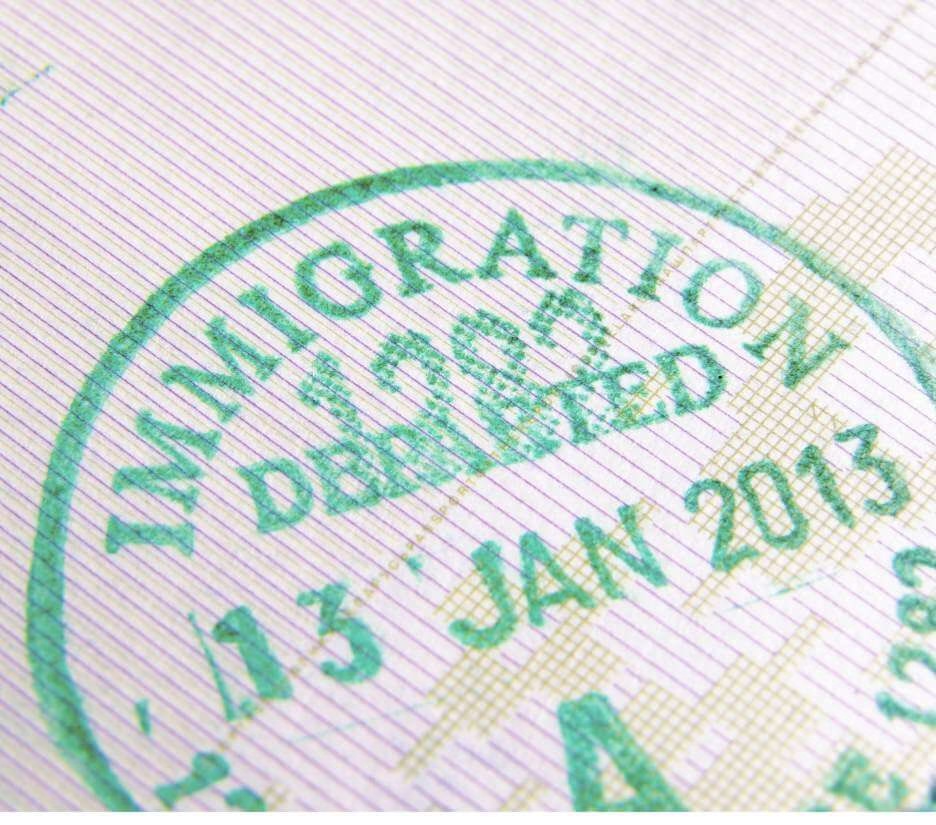Your UAE Visa Expired Outside the Country? Here’s What You Must Do Immediately

What Happens If My UAE Residency Visa Expires While I’m Outside the Country?
If you’re a UAE resident and your visa expires while you’re abroad, it’s important to understand how this affects your ability to return, cancel your visa, or apply for a new one. Whether you’re away for vacation, business, or emergency reasons, knowing the current regulations can help you avoid fines, delays, and rejection at the border.
This guide breaks down what happens, step-by-step, based on your nationality, visa type, and how long you’ve been away.
Re-entering the UAE with an Expired Residency Visa
1. If You’re from a Visa-on-Arrival Country
If your passport allows you to get a visa on arrival:
- Your expired UAE residency visa will be automatically cancelled in the system when you re-enter.
- You will be granted entry under visa-on-arrival status.
- However, this does not complete the formal cancellation of your old residency visa.
You must still cancel your expired residency visa through proper administrative channels (ICP or GDRFA), and:
- Pay any fines tied to your previous visa.
- Clear all pending obligations (e.g., Emirates ID return, labor file closure).
- If you don’t, your next visa application can be delayed or rejected.
2. If You’re Not Eligible for a Visa on Arrival
If your nationality does not qualify for a visa on arrival:
- You cannot re-enter the UAE using an expired visa.
- You must first cancel your previous residency visa remotely through your employer or sponsor.
- Only then can you apply for a new tourist visa or entry permit.
In some cases, you may need to return to your home country to complete the process.
Canceling Your Residency Visa While Outside the UAE
If your residency visa expired while you were abroad, proper cancellation is crucial to avoid immigration blocks.
You (or your Sponsor) will need to:
- Submit a cancellation request via the ICP or GDRFA portal.
- Provide:
- Your passport copy
- Emirates ID copy
- Sponsor’s documents (for employer or investor visas)
- Settle any fines or dues
- Wait for approval confirmation
This process can be completed remotely through an authorized visa agent like EZONE’s business setup experts, no travel required
Applying for a New UAE Residency Visa
After cancellation, the next steps are:
- Apply for a new entry permit
- Enter the UAE
- Complete medical testing
- Apply for a new Emirates ID
- Submit residency stamping request
Make sure all previous records are cleared before starting this process.
Automatic Visa Cancellation After Extended Time Abroad
According to UAE immigration rules, most residency visas are invalidated if the holder remains outside the country for more than 180 consecutive days. Even if the visa is still within its validity period, it can become void due to extended absence.
However, there are exceptions:
- Partners/investors can stay outside the UAE for up to 364 consecutive days without affecting their visa status.
- Golden Visa holders and their dependents are allowed to stay outside the UAE for up to two years without cancellation, as long as the visa remains valid.
- Residents with a valid reason may apply for a Re-Entry Permit through ICP or GDRFA after being abroad for more than 180 days. Reasons may include medical treatment, education, or humanitarian considerations. A fee of AED 100 applies for every 30 days spent outside the country.
- Once the Re-Entry Permit is approved, the applicant must return to the UAE within 30 days.
Who Is Exempt from the 180-Day Abroad Rule?
Certain visa holders are exempt from automatic cancellation after 180 days abroad. These include:
- Foreign spouses
- Domestic helpers accompanying Emiratis with scholarships or medical treatment
- Domestic workers for UAE diplomats or members of the ruling families
- Students studying in universities abroad
- Investors with valid UAE visas
- Public sector expatriate workers
- Residents sponsored by UAE diplomatic or consular offices
- Any individual exempted under special circumstances at the discretion of the ICP
These exemptions reflect humanitarian, official, and long-term engagement cases where extended absence is justifiable.
Grace Periods Do Not Apply When Abroad
Grace periods of 30 to 180 days after visa expiry are applicable only if you’re physically present in the UAE. If your visa expires while you’re outside the country, these grace periods do not apply, and your visa is considered canceled after 180 days abroad.
Visa Amnesty Programs Are Inapplicable Abroad
UAE’s visa amnesty programs are designed for individuals who have overstayed their visas while in the country. If your visa expires while you’re abroad, these amnesty provisions do not apply. These programs typically support humanitarian goals such as family reunification and crisis support for those within the UAE.
Employment and Labor Card Implications
If your employment visa expires while you’re abroad:
- Your labor card is automatically canceled.
- You cannot work in the UAE until a new visa and labor card are issued.
- If your employer fails to cancel your visa, you may need to contact the Ministry of Human Resources and Emiratisation (MOHRE) for assistance.
Tenancy Contracts and Utility Services
An expired residency visa can affect your tenancy agreements and utility services:
- Landlords may not renew tenancy contracts without a valid residency visa.
- Utility services (like DEWA) may be disrupted if linked to an expired visa.
It’s advisable to inform your landlord and utility providers about your visa status and provide evidence of renewal or cancellation processes.
Bank Accounts and Financial Services
When your UAE residency visa expires while you’re outside the country, it’s crucial to understand how this can affect your banking relationships and financial services. UAE banks have strict compliance policies linking customer accounts to valid residency visas, and an expired visa can trigger significant consequences, even if you’re overseas.
What Happens to Your Bank Account?
Reclassification as Non-Resident:
When banks detect that your residency visa has expired (especially through automatic system checks linked to Emirates ID or bank KYC systems), they may reclassify your account as a “non-resident account”. This means:
- Certain privileges like checkbook issuance, personal loans, and overdrafts may be suspended.
- Additional requirements may apply for ongoing transactions, such as international transfers.
Possible Account Freezing:
Some banks may freeze or restrict access to accounts with expired residency visas, particularly if:
- They detect no updated visa or Emirates ID renewal record in the system.
- There’s an alert triggered during KYC compliance checks.
- The account shows patterns of inactivity combined with expired residency documentation.
This can disrupt access to funds, standing orders, credit cards, and even online banking.
How to Avoid Banking Disruptions
Notify Your Bank Early:
Inform your bank well in advance of your visa expiration or before traveling abroad. Some banks may offer temporary extensions or allow a grace period for updating documentation.
Submit Updated Documents:
Provide valid alternative documents if available, such as:
- Proof of visa renewal application
- A new Emirates ID (if renewed from abroad)
- Evidence of ongoing residency processing (for example, an entry permit application)
Consider “Non-Resident” Account Options:
Ask your bank if you can convert your account to a non-resident status to maintain access, though with potentially limited features.
Maintain Regular Contact:
Stay in touch with your relationship manager or branch to manage any administrative issues that arise while you’re overseas.
Dependent Visas
If you are a UAE resident sponsoring family members, your residency visa forms the legal basis for your dependents’ visas. If your visa expires while you’re abroad, your dependents’ visas are automatically linked to your status, and here’s how this impacts them:
Automatic Visa Cancellation:
Once your visa expires or is canceled while you’re outside the UAE, the system automatically cancels all dependent visas linked to it. This means:
- Spouses, children, and any sponsored domestic staff lose their valid residency status in the UAE.
- Any re-entry attempt by dependents is subject to immigration review.
Dependents Abroad:
If your dependents are also outside the UAE when your visa expires:
- They cannot re-enter the UAE until you (the sponsor) obtain a new residency visa and re-sponsor them.
- This includes situations where dependents are studying abroad, visiting family, or traveling.
Dependents Inside the UAE:
If dependents are inside the UAE, they may have a limited grace period (typically 30 days) to:
- Switch to another sponsor (e.g., spouse, employer)
- Apply for a new visa category (e.g., student visa)
- Exit the country to avoid overstay fines.
Documentation Challenges:
Re-sponsoring dependents after re-entry requires:
- A valid sponsor visa
- Proof of relationship (marriage certificate, birth certificates)
- Emirates ID renewals and medical fitness tests for each dependent
Recommended Action: Plan your visa renewal well in advance to avoid gaps in your dependents’ residency status. If your visa expires while abroad, consider:
- Returning to the UAE on a tourist visa (if eligible)
- Canceling your expired visa is simple when handled by our expert EZONE agents.
- Applying for a new residency visa to restore sponsorship rights
Re-Entry into the UAE
Once your UAE residency visa has expired while you’re outside the country, re-entering the UAE depends on your nationality and the type of visa you’re eligible for:
Visa-on-Arrival Nationals:
Citizens of countries eligible for a visa-on-arrival (e.g., the UK, USA, EU countries, and Australia) can typically enter the UAE as tourists. However, their previous residency visa will be automatically canceled upon arrival, and they must still formally cancel it via ICP or GDRFA channels. Failure to complete this administrative step can lead to issues with future visa applications, potential fines, or complications when exiting the UAE.
Non-Visa-on-Arrival Nationals:
Nationals of countries that do not qualify for a visa on arrival must apply for a new entry permit (e.g., tourist visa or visit visa) before traveling to the UAE. Without a valid entry permit, they cannot board the flight or gain entry at the UAE airport. Once in the UAE, they need to cancel their previous residency visa through proper channels to avoid problems with future visa applications.
In both cases, the expired residency visa is considered canceled for practical purposes, but formal cancellation paperwork is still required to clear your record in the immigration system. Any outstanding fines, Emirates ID obligations, or incomplete labor cancellations may delay or complicate the new visa process.
Passport Expiry While Abroad
If both your passport and UAE visa expire while you are abroad:
- Contact your home country’s embassy or consulate to issue a new passport or temporary travel document.
- Once the passport is renewed, proceed with remote visa cancellation or re-entry permit applications as required.
Applying for a Re-Entry Permit
If you have a valid reason for staying abroad beyond the standard 180-day limit (e.g., medical treatment, education, official assignments, humanitarian cases), you may be eligible to apply for a re-entry permit to preserve your residency visa. Here’s how it works:
Eligibility Criteria:
- The reason for extended stay abroad must be documented and legitimate.
- Medical Treatment: Hospital or doctor’s letters
- Education: Proof of enrollment in a recognized institution
- Official Assignments: Employer letters or government approvals
- Humanitarian Considerations: Family emergencies, special circumstances
Application Process:
- The Re-Entry Permit must be applied for while you are still outside the UAE.
- Application is submitted via:
- The ICP Smart Services portal for Abu Dhabi and the northern emirates
- GDRFA for Dubai residents
- Required documents include:
- Passport copy
- Emirates ID copy (if still valid)
- Proof of the reason for extended stay abroad
- Payment of fees
Fees:
- AED 100 is charged for every 30-day block spent abroad after the 180-day limit.
- Additional administrative fees may apply depending on the emirate.
Validity and Use:
- Once approved, the permit allows you to re-enter the UAE within 30 days from the date of approval.
- Failure to return within the validity period results in automatic visa cancellation.
It’s important to note that re-entry permit approval is not guaranteed; applications may be rejected if the documentation is insufficient or the reason does not qualify.
Final Thoughts
Managing your UAE residency while living or traveling abroad can be complex, especially with evolving regulations and varying rules based on visa type and nationality. If you are dealing with an expired visa, considering re-entry, or looking to apply for a new residency, it is essential to approach the process correctly.
EZONE offers full support with:
- Remote visa cancellations
- Re-entry permits
- New visa applications
- Business setup and relocation support
- Other PRO services
Let us handle the paperwork and process so you can move forward with confidence.
Contact EZONE today to speak with an expert and get step-by-step guidance on your next move.
FAQs:
Only if you're eligible for a visa on arrival. Otherwise, you’ll need a new entry permit.
Yes. Even if it was voided on the system, you must file official cancellation paperwork to clear your immigration record.
You can check your visa status through the GDRFA (Dubai) or ICP (other emirates) online services.
Yes. EZONE can coordinate remote visa cancellations, initiate new entry permits, and help manage your re-entry or business setup.
EZONE specialize in creating content that highlights business setup and consultancy services. We provide expert insights on company formation, licensing, and the latest industry developments. Through this blog, we aim to equip entrepreneurs and businesses with the knowledge they need to navigate opportunities and challenges in today's market.



